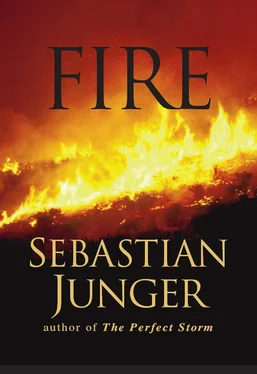The helicopters flew to a small town just across the border called Khvajeh Baha od Din, and we were provided a floor to sleep on in the home of a former mujahidin commander who was now a local judge. Each night, anywhere from ten to twenty fighters stayed there, sleeping in rows on the floor next to us. The electricity was supplied by a homemade waterwheel that had been geared to a generator through an old truck transmission. Some fuel came in by truck over the mountains—a five-day trip—but farther north it all came in by donkey and cost twenty dollars a gallon. (The locals jokingly refer to donkeys as “Afghan motorcycles.”) We washed at an outdoor spring and subsisted on rice and mutton and kept warm at night around a woodstove; we lived comfortably enough. The situation around us, though, was unspeakable.
Eighty thousand civilians had fled the recent fighting, adding to the hundred thousand or so who were already displaced in the north, and thousands of them were subsisting in a makeshift refugee camp along the Kowkcheh River half a mile away. They slept under tattered blue UN tarps and had so little food that some were reduced to eating grass. Tribal politics have long dominated Afghanistan; many observers, in fact, say that Massoud, a Tajik, will never be able to unite the country. These refugees were mostly ethnic Tajiks and Uzbeks, and they claimed that when the Taliban, who are Pashtun, took over a town, they raped the women, killed the men, and sold the young into servitude. One old man at a refugee camp pulled back his quilted coat to show me a six-inch scar on his stomach. A Taliban soldier, he said, had stabbed him with a bayonet and left him for dead.
A week or so after we arrived inside Afghanistan, Reza and I were told that Massoud was coming in—he’d been in Tajikistan, negotiating support from the government—and we rushed down to the river to meet him. A lopsided boat made of sheet metal, powered by a tractor engine that had paddle wheels instead of tires, churned across the Kowkcheh with Massoud in the bow. He wore khaki pants and Czech Army boots and a smart camouflage jacket over a V-neck sweater. He looked to be in his late forties and was as lean and spare as the photographs of him from the Soviet days. He was not tall, but he stood as if he were. The great man stepped onto the riverbank along with a dozen bodyguards and greeted us. Then we all drove off to the judge’s compound in Khvajeh Baha od Din.
There he met with his commanders, listened to their preparations for the coming offensive, then hurried off. We later found out that he’d been forced to return to Tajikistan because of a chronically bad back; apparently the problem was so severe that it had put him in the hospital.
Finding ourselves once again waiting for Massoud, Reza and I decided to go out to the front line to see a position that had just been taken from the Taliban. We drove south along the Kowkcheh, past miles of trenches and bunkers, and stopped at an old Soviet base that had been gutted by artillery fire. The local commander was there, housed in the shell of the building. The wind whistled through the gaping windows, and his soldiers crouched in the shadows, preparing their weapons. The commander said that the position they’d taken was code-named Joy and that the bodies of the dead Taliban were still lying in the trenches.
He made a call on his radio and arranged for some men and packhorses to meet us on the other side of the river. Then he directed us to the crossing point; it was in a canyon a few miles away, just below a town called Laleh Meydan. When we stopped there to sort our gear, a Taliban MiG jet appeared and made a pass over the town, completely ignoring the antiaircraft fire that was directed at it. The townsmen scattered but drifted back within minutes to help us carry our gear down to the river. The raft that was to ferry us across was made from a design that must have been around since Alexander the Great: eight cowhides sewn shut and inflated like tires, each stoppered by a wood plug in one leg and lashed to a frame made of tree limbs. Four old men paddled it across the river and then tied our gear to some horses. Three soldiers with Kalashnikovs were waiting to take us to the front.
It took us all afternoon to get there, walking and riding through mud hills, bare and smooth as velvet, that undulated south toward the Hindu Kush. There was no sound but the wind—not even any fighting—and nothing to look at but the hills and the great, empty sky. When we turned the last ridgeline, we saw Massoud’s men silhouetted on a hilltop, waving us on.
Maybe the Taliban spotted our horses, or maybe they’d overheard the radio communications, but we were halfway up the last slope when I found myself facedown in the dirt as a Taliban rocket slammed into the hillside behind us. Then we were up and running, and the next rocket hit just as we got to the top, and they continued to come in, slightly off target, as we crouched in the safety of the trenches.
There was nothing exciting about it, nothing even abstractly interesting. It was purely, exclusively bad. Whenever the Taliban fired off another salvo, a spotter on a nearby hilltop would radio our position to say that more were on the way. The commander would shout a warning, and the fighters would pull us down into the foxholes, and then we’d wait five or ten seconds until we heard the last, awful whistling sound right before they hit. In a foxhole you’re safe unless the shell drops right in there with you, in which case you’d never know it; you’d simply cease to exist. No matter how small the odds were, the idea that I could go straight from life to nonexistence was almost unbearable; it turned each ten-second wait into a bizarre exercise in existentialism. Bravery—the usual alternative to fear—also held no appeal, because bravery could get you killed. It had become very simple: It was their war, their problem, and I didn’t want any part of it. I just wanted off the hill.
The problem was, “off” meant rising out of this good Afghan dirt we’d become part of and running back the way we’d come. Four hundred yards away was a hilltop that they weren’t shelling; over there it was just another normal, sunny day. After we’d spent half an hour ducking the shells, the commander said he’d just received word that Taliban troops were preparing to attack the position, and it might be better if we weren’t around for it. Like it or not, we had to leave. Reza and I waited for a quiet spell and then climbed out of the trenches, took a deep breath, and started off down the hill.
Mainly there was the sound of my breathing: a deep, desperate rasp that ruled out any chance of hearing the rockets come in. The commander stood on the hilltop as we left, shouting good-bye and waving us away from a minefield that lay on one side of the slope. Ten minutes later it was over: We sat behind the next ridge and watched Taliban rockets continue to pound the hill, each one raising a little puff of smoke, followed by a muffled explosion. From that distance, they didn’t look like much; they almost looked like the kind of explosions you could imagine yourself acting bravely in.
The Taliban kept up the shelling for the next twelve hours and then attacked at dawn. Massoud’s men fought them off with no casualties.
Massoud returned one week later, flying in by helicopter to Harun’s command post to start planning a heavy offensive across the entire northern front. The post was at the top of a steep, grassy hill in some broken country south of a frontline town called Dasht-e Qaleh. It was late afternoon by the time we arrived, and Massoud was studying the Taliban positions through a pair of massive military binoculars on a tripod. The deposed Afghan government’s foreign minister, a slight, serious man named Dr. Abdullah, walked up to greet us as we got out of the truck. Reza wished him a good evening.
Читать дальше












